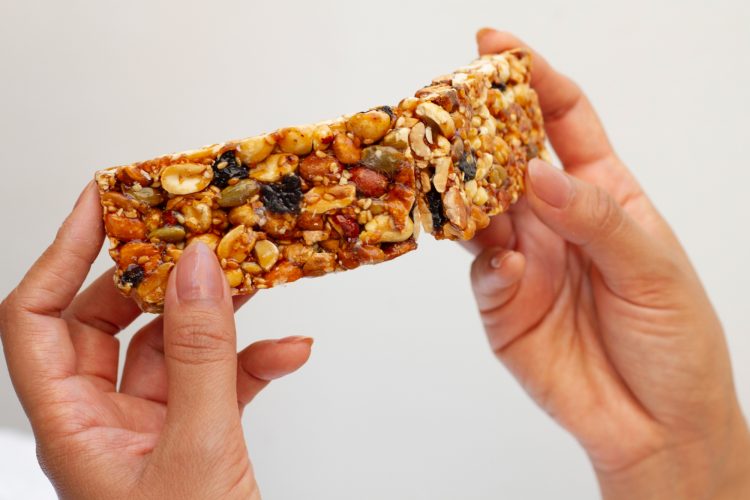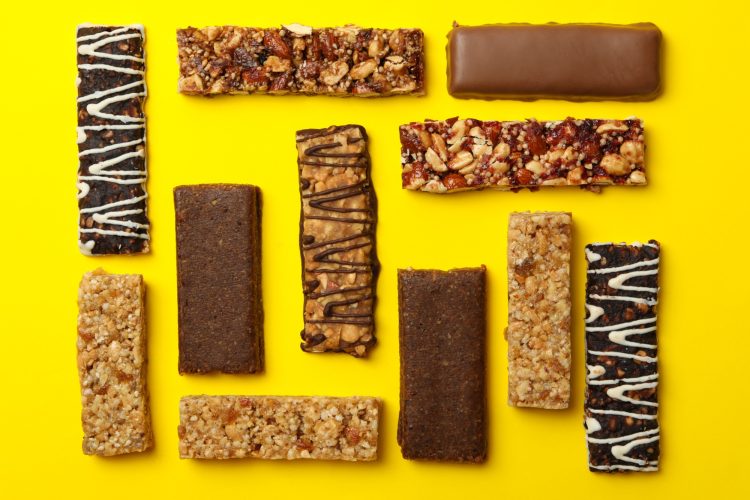Protein bars can be a healthy snack, depending on the ingredients. However, you must look for bars with whole foods, minimal added sugar, and a good balance of protein, carbs, fiber, and healthy fats. Remember, protein bars shouldn’t replace whole-food meals in your diet, but they can be convenient for on-the-go nutrition.
Our muscles soak nutrients like sponges after a training session. However, eating a protein-rich meal immediately after a workout isn’t always possible for most people. This is where protein bars shine. Most protein bars geared toward bodybuilders contain 20-25 grams of protein, which hits the sweet spot for an adequate amount of protein per meal.
That said, not all protein bars are created equal. While some can help you with your bodybuilding ambitions, others can sabotage your overall health and well-being.
As a self-styled protein bar connoisseur who has been lifting weights for over 16 years, I have tried almost every bar on the market. That’s not all; I’ve gathered expert advice and opinions from nutritionists, dietitians, and sports medicine professionals to help you decide if protein bars are the right choice for you.
Ideal Nutritional Value of Protein Bars
Before dissecting protein bars, let’s understand the reason behind their popularity.
As the name suggests, protein bars contain a high amount of protein, which is the building block of muscle. It is essential for lifters aiming to build bigger and stronger muscles. Protein is incredibly satiating and can keep you full for an extended period.
With that out of the way, you must know that no two protein bars are the same. They have different ingredients and nutrient profiles, which can support or sabotage your progress.
Here’s how to know if your protein bar is healthy:
- Protein: A protein bar must have between 15 to 20 grams of protein. Check for the source of the protein. Animal sources are more bioavailable than plant sources.
- Carbs: Anything between 20 to 30 grams of carbohydrates is a decent number. This will ensure the bar provides enough energy without excessively spiking your blood sugar.
- Fats: Aim for 5 to 15 grams of fats in a bar. Healthy fats are essential for satiety and ensure smooth overall body function.
- Sugar: This should be less than 10 grams. Some delicious-tasting protein bars have up to 20 grams of added sugar per serving. That said, you must favor bars with natural sugars from whole fruits. Avoid added sugars (corn syrup, dextrose, fructose) or sugar alcohols (xylitol, mannitol, sorbitol, erythritol).
- Fiber: The protein bar should have at least 5 grams of fiber. This promotes optimal digestibility and ensures your body is making the most of the nutrients. It will also help keep you full.
As long as you stick to these values while buying a protein bar, you are golden.
The Good: When Protein Bars Can Be Beneficial
Many people are on the fence about whey protein powders. They argue that drinking protein shakes can negatively affect the kidneys.
However, that is now the case with protein bars. The general population is lapping up protein bars. They are everywhere: the gym, the supermarket, even the gas station. Here are a few reasons protein bars are such a hit:
Convenient Pre- and Post-Workout Nutrition
Pre-workout nutrition is essential to ensuring optimal gym performance. Conversely, a balanced post-training diet is key to promoting recovery.
“Protein bars can provide necessary nutrients, like protein, iron, calcium, and fiber, and some also provide caffeine for a pick-me-up,” said Sarah Schlichter, M.P.H., RDN, while promoting their pre-workout benefits.
Most experts recommend consuming a high-protein meal within two hours of the training session to promote hypertrophy. This window where the muscles absorb the most amount of nutrients is known as the anabolic window.
Great For Busy People
Eating healthy takes effort and constraint. You must prepare your meals in advance to ensure you stay on track with your fitness goals. Even then, once in a blue moon, most of us find ourselves in a situation where we don’t have access to healthy food.
Protein bars can be a lifesaver in these situations.
“Protein bars are a convenient alternative for someone who would otherwise be reaching for a doughnut or using the vending machines for snacks at the office,” says Liz Applegate, Ph.D., lecturer in nutrition at the University of California at Davis.
Indulgence-Buster
People on a strict diet plan occasionally crave something sweet. While cheesecakes and muffins are out of the question, most protein bars are sweet enough to satisfy your cravings. Furthermore, they are packed with healthy nutrients that can improve your overall health.
Protein bars can be an excellent choice for athletes with high training demands who need a quick nutrition fix. They are portable, convenient to eat, and packed with the right nutrients to boost recovery.
The Bad: Are Protein Bars Really Healthy?
These are the factors you must consider before grabbing that delicious protein bar:
High Sugar Content
The American Heart Association recommends men consume no more than 36 grams of added sugar daily and women no more than 25 grams. (1)
Many protein bars are loaded with added sugar. There are two reasons behind adding so much sugar to the bars. First, it can improve the taste of the bar. Second, it can give you an instant energy boost. However, these energy kicks are usually accompanied by crashes. Plus, the overall sugar content does more harm than good.
“When you look at how much added sugar and saturated fat is in there, some of them (are) essentially glorified candy bars,” said Caroline Susie, a registered dietitian and spokesperson for the Academy of Nutrition and Dietetics.
Processed Ingredients
Closely analyze a protein bar ingredient list, and you’ll probably find many ingredients that you can’t even pronounce. These processed ingredients, artificial sweeteners, and additives do nothing more than improve the bar’s taste, texture, and smell.
Health Food and Meal Replacement Illusion
Most sports nutrition companies slap ‘protein’ in big font on the product’s label to suggest a healthy, muscle-building snack. They leverage protein’s satiating and metabolism-boosting effects to market the bars as meal replacements.
Whitney Linsenmeyer, Ph.D., assistant professor at Saint Louis University, chimed in with her opinion on considering protein bars a meal replacement.
“I’ll use them if I really need something to eat and I have no other options, but they’re not meant to be a meal replacement. So we’re not using them to replace whole foods.” — Whitney Linsenmeyer
Most protein bars lack the micronutrients of real food to consider them as meal replacements.
Impact on Gut Health
Protein bars usually contain high amounts of artificial sweeteners, hard-to-process fibers, and other additives, which can wreak havoc on your digestive system. Some of my clients report feeling bloated after consuming a particular brand of protein bars.
Pro Tip: Favor bars with whole-food ingredients and pay close attention to how your body responds to them.
How To Make Informed Choices While Choosing a Protein Bar
There are good protein bar options on the market, and then there are bad (very bad) products. This section will help you make the right choices:
Key Ingredients To Avoid in Protein Bar
Ensure your protein bar doesn’t have the following ingredients:
Sugar Variants
Nutrition companies have found sneaky ways of adding sugars to supplements. If an ingredient ends in “-ose” (like glucose, fructose, maltose), it is sugar and bad for your health.
“Many protein bars can be high in sugars or sugar alcohols, which can irritate some people and lead to gastrointestinal distress and discomfort,” cautions Schlichter.
Artificial Fillers
If the nutrition label lists an ingredient that sounds like something from another planet, it is probably because it is meant for aliens. Fancy names are a clever way of masking highly processed ingredients.
Unhealthy Fats
You must avoid hydrogenated oils (trans fats) and excessive saturated fats to ensure you are not building too much plaque in the arteries, which can lead to clogging.
Understand Your Needs
Brands make different kinds of protein bars for a reason — they are geared toward people with varying goals. People eating these bars as a healthy snack would be fine with a 10-gram protein per serving. However, those aiming for hypertrophy should pick a bar that offers at least 20 grams of protein.
Read The Labels
You don’t want a protein bar with excessive fats, carbs, or sugar. Spend the time analyzing the ingredient list to ensure the bar can help you achieve your weight loss or muscle-building objectives.
Prioritize Whole Foods
“We’ve all been there where we’ve had a protein bar for lunch at an airport,” Linsenmeyer says. She recommends eating fresh fruit or a cup of veggies to make the meal more balanced and well-rounded.
Whole foods like lean meats, eggs, fish, legumes, and nuts should form the basis of your diet plan. Balancing these food sources will ensure you meet your daily macro and micronutrient needs.
“Protein bars can pair well with carbohydrate foods and snacks, improving blood sugar control. For example, pairing a protein bar with a piece of fruit is a great example of a balanced snack that can help keep blood sugar steady and stable,” notes Schlichter
According to a study published in Age (Dordr), stable blood sugar translates to sustained energy and can also boost cognitive function. (2)
That said, you shouldn’t become overly reliant on protein bars to meet your nutritional needs.
Steve Hertzler, Ph.D., RD, assistant professor of medical dietetics at Ohio State University, addressed a common misconception of people who prefer eating protein bars over real meals.
“Some people go to Costco and buy boxes of energy bars and feel, ‘I’m doing a good thing by eating them. They may think that these bars are better than food. But there are ingredients in foods that are missing from these bars. Just as you wouldn’t want to live only on peaches or only on tuna sandwiches, you need a lot more in your diet than just energy bars.”
Conclusion
Protein bars can be a healthy snacking option. However, you should not use them as meal replacements and must be mindful of their ingredients. Choose the products with the least amount of added sugar and artificial ingredients. Highly processed foods can be detrimental to your overall health and well-being.
Let me know if you have any questions about adding protein bars to your diet, and I’ll be happy to help!
References
Fitness Volt is committed to providing our readers with science-based information. We use only credible and peer-reviewed sources to support the information we share in our articles.
- American Heart Association (2024, April 8). How much sugar is too much? American Heart Association.
- Samaras K, Lutgers HL, Kochan NA, et al. The impact of glucose disorders on cognition and brain volumes in the elderly: the Sydney Memory and Ageing Study. Age (Dordr). 2014;36(2):977-993. doi:10.1007/s11357-013-9613-0
Tip: If you're signed in to Google, tap Follow.













